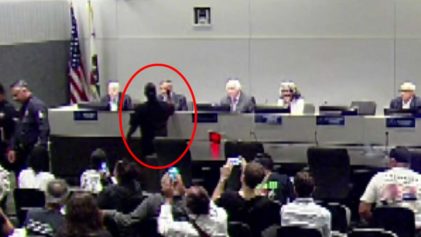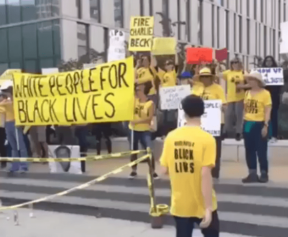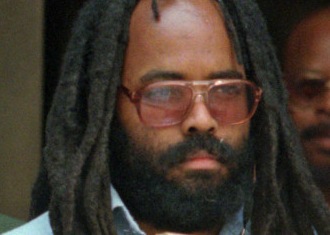The city of Los Angeles is offering a $1 million bounty for information leading to the arrest of fugitive cop killer Christopher Dorner, the largest such bounty in Los Angeles history.
As authorities continue their manhunt with Dorner’s trail growing colder in the frigid mountains outside of Los Angeles, the city’s mayor, Antonio Villaraigosa, announced the reward yesterday at a news conference at LAPD headquarters.
“This is an act, make no mistake about it, of domestic terrorism,” said LAPD Chief Charlie Beck.
Dorner, 33, is accused of killing three people, including a Riverside police officer. More details emerged about Dorner’s firing by the LAPD, a subject that has gotten intense scrutiny in recent days after Dorner posted a long manifesto on Facebook claiming he was wrongfully terminated by a racist and corrupt police department. Beck announced that the department was reopening Dorner’s termination case “to reassure the public that their Police Department is transparent and fair in all the things we do.”
A story in the Los Angeles Times reveals that Dorner didn’t want his sergeant to report the claims he made against his training officer, Teresa Evans. Dorner alleged that when they responded to a disturbance at the DoubleTree Hotel in San Pedro on July 28, 2007, they found Christopher Gettler, who was uncooperative and threw a punch at them, which prompted Evans to use a Taser. Two weeks later, Dorner went into the office of Sgt. Donald Deming at the Harbor Division police station with tears in his eyes, Deming later testified.
“I have something bad to talk to you about, something really bad,” Dorner told Deming, according to the report in the Times.
Dorner then said Evans had kicked Gettler once in the face and twice in the left shoulder or nearby chest area — then Deming told Dorner not to include the kicks on the arrest report.
“Promise me you won’t do anything,” Dorner asked Deming.
“No, Chris. I have to do something,” Deming responded.
Even though Gettler’s father testified at the disciplinary panel hearing that his son told him he had been kicked and had swelling on his face, the panel concluded the the son was too mentally ill to be reliable. Other witnesses testified that they did not see Evans kick Gettler.
Dorner’s attorney, Randal Quan, acknowledged that Dorner should have reported the kicks earlier, but he said Dorner ultimately did the right thing and called the case against Dorner “very, very ugly.”
“This officer wasn’t given a fair shake,” Quan said, according to transcripts of the board hearing. “In fact, what’s happening here is this officer is being made a scapegoat.”
Dorner told the board he was initially afraid to report the incident because he was a rookie who had already filed complaints against fellow officers and so feared retaliation from the department.
But the investigation concluded that Dorner made up large parts of the confrontation with Gettler. The board’s three members — two LAPD captains and a criminal defense attorney — unanimously ruled against Dorner and said his claims lacked credibility. They believed he was motivated in part by his fear that Evans would give him a poor evaluation that could end his career — so he fabricated the charge against her, even though Gettler had told his father the same thing that Dorner told his sergeant, that he had been kicked.
As for Quan, whatever he did on Dorner’s behalf apparently wasn’t satisfactory to Dorner. Dorner wrote in his manifesto that Quan was still working to protect the LAPD. So Quan’s daughter Monica, an assistant women’s basketball coach at Cal-State Fullerton, was his first victim, along with her fiance, Keith Lawrence, a public safety officer at the University of Southern California. The two met when they were student athletes at Concordia University. They were found slumped over in their car in a parking garage near their condominium in Irvine. They had been killed on Sunday evening after leaving a Super Bowl party.


